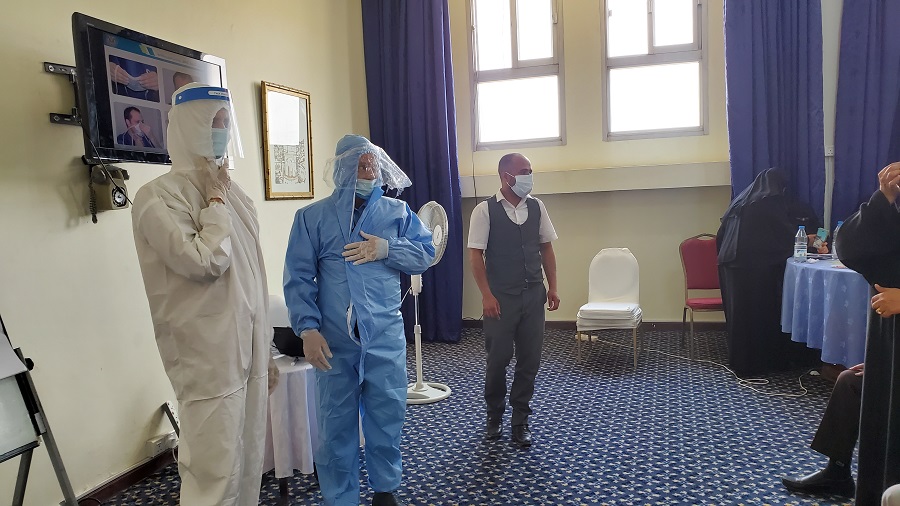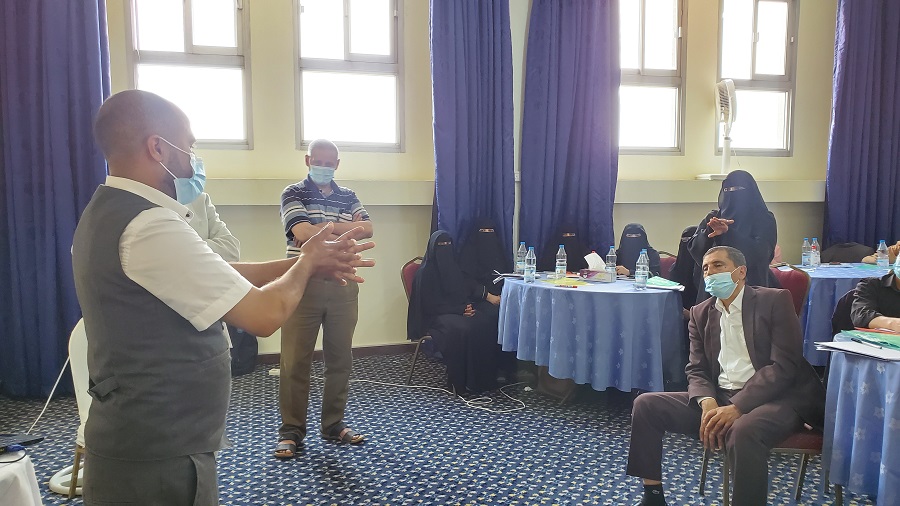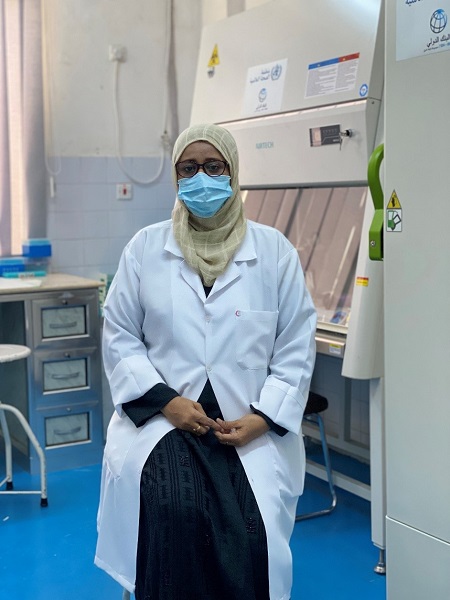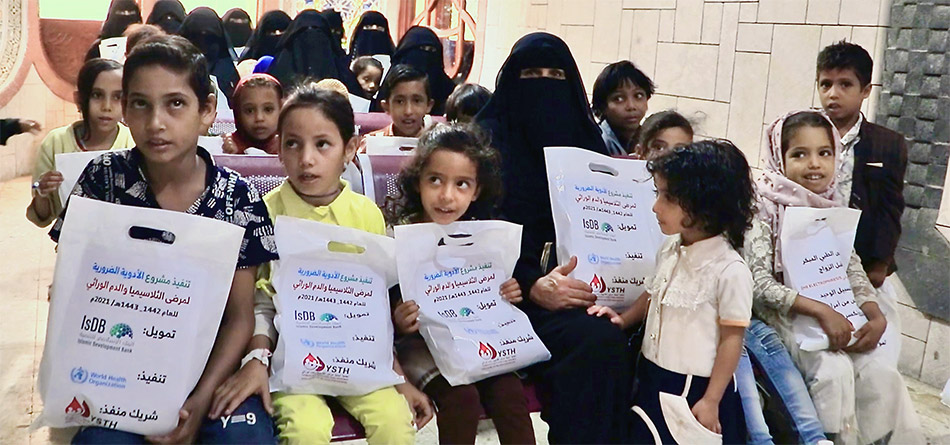Baby Bushra beats the odds in Hajjah
Rataban-Mabin district, 2 March 2022 – When Bushra was eight months old, her body grew more frail by the day and she developed diarrhea and a fever for more than a week. Her mother said: “I refused to transfer her to the city, not because I don’t love my child, but because we don’t have the cost of treatment and medicine. We were watching her dying for three painful days, after we learned from our village doctor that there is a health facility which offered free treatment. We rushed to the hospital hoping it wasn’t too late for my daughter.”
Bushra arrived at the therapeutic feeding center in a critical condition. The medical team immediately took her to the emergency management unit to stabilize her in line with the WHO protocol.
Dr Adel al-Abdeli, a paediatric specialist, was responsible for Bushra’s emergency care and assessment on his daily rounds. After four days of close monitoring and treatment, Bushra’s condition improved significantly. After recovery, she was referred to the outpatient clinic to continue her nutritional treatment and monitor her weight towards making a full recovery.
 Bushra when she arrived at the Al-Jumhori Public Hospital therapeutic feeding center in Hajjah being assessed by Dr Adel al-Abdeli, a paediatric specialist
Bushra when she arrived at the Al-Jumhori Public Hospital therapeutic feeding center in Hajjah being assessed by Dr Adel al-Abdeli, a paediatric specialist
Bushra’s mother was overjoyed by her daughter’s progress, and at the same time was able to benefit from educational sessions on personal hygiene and appropriate feeding practices for infants and young children.
Note: WHO through the Emergency Health and Nutrition Project (EHNP) and its successor the Emergency Human Capital Project (EHCP), both funded by the World Bank, supports 109 therapeutic feeding centres across Yemen, including the one at Al-Jumhori Public Hospital in Hajjah.
Over 3000 health workers empowered to stop infections in their tracks
 The training demonstrated to health workers how to correctly put on and remove personal protective equipment
The training demonstrated to health workers how to correctly put on and remove personal protective equipment
Aden | Sana’a, 1 March 2022 – Over the past 2 years, communities everywhere have seen how quickly COVID-19 spreads. Even aside from the pandemic, in low- and middle-income countries, an estimated one in 10 people who are hospitalized will acquire a health care-associated infection. While data on the prevalence of such infections caused by the COVID-19 virus is not yet available in Yemen, WHO and local authorities, with the support of the World Bank, are investing in strengthening knowledge, skills and capacities to prevent infections in health facilities.
Through the Yemen COVID-19 Response Project, 87 training sessions have been held, targeting 3055 health care workers in 37 isolation units, supported by the Project across 14 governorates in Yemen.
The training aimed to enhance the knowledge of health workers and strengthen the implementation of protocols for infection prevention and control to provide a safe environment for health workers and patients.
 Hand hygiene practices were demonstrated to participants
Hand hygiene practices were demonstrated to participants
Dr Hashim Abdullah Al Barawi, an intensive care nurse at Dhamar General Hospital, who participated in the training said, “The training was excellent. We used to misunderstand the safe usage of some of the medical equipment. The training cleared this confusion for us.” His colleague, Dr Faizah Al Riashi, Obstetric Emergency Supervisor, added “We do have backgrounds in some of the issues addressed through the training but practical demonstration was lacking which this training covered.”
They also expressed a desire that such capacity-building activities would take place for as many health workers as possible in Yemen to improve their performance and keep them up to date on safe infection prevention and control practices.
Note: The Yemen COVID-19 Response Project was launched in 2020 to detect and respond to the threat posed by COVID-19 and prevent the virus from spreading among the population of Yemen, through funding, supporting and strengthening the national health system in the country.
Related link
We started from zero: WHO and World Bank supporting COVID-19 response in war-torn Yemen by improving access to testing
“We had zero testing capacity, no one was trained, many health care workers neglected their role due to fear of COVID-19, but now with the support of WHO and the World Bank, all of us are trained and provided with lab equipment and supplies to help us minimize the spread of COVID-19 and revitalize Yemen’s destroyed health infrastructure,” Dr Mayada Gaafer, Deputy Head of Molecular Biology Laboratory, Central Public Health Laboratory, Aden

ADEN, 2 February 2022 – Dr Mayada is one of the first frontline health workers confronting the national laboratory response to the COVID-19 pandemic in Yemen. Despite a national shortage of health workers due to the fear and stigma surrounding COVID-19, Dr Mayada, unshaken, was one of the only laboratory workers at the central public health laboratory at Al-Jumhuriah Hospital, Aden.
The conflict in Yemen has had a catastrophic effect on the weak and struggling health system in the country. The rise of COVID-19 cases put an additional enormous strain on Yemen's public health system, putting the lives of millions at risk, as only half of the nation's health facilities are currently functioning.
The national laboratory at Al-Jumhuriah Hospital was looted and abandoned during the conflict, limiting the national testing capacity. Dr Mayada vividly remembers, "After the war, the lab was isolated, and in ruins, but now there is a glimmer of hope, and we started from zero".
To prevent a total collapse of Yemen's health system, WHO's Yemen COVID-19 Response Project, in partnership with the World Bank’s International Development Association, has supported the response of central public health laboratories to the COVID-19 pandemic. With this support, the laboratory located within Al-Jumhuriah Hospital in Aden is now one of the 15 functioning laboratories and hospital laboratories providing testing for COVID-19 in Yemen.
The project provided laboratory equipment for diagnostic testing, including polymerase chain reaction (PCR) machines, PCR diagnostic kits for COVID-19, laboratory supplies, tubes, pipette tips, nasopharyngeal swabs, and ribonucleic acid (RNA) extraction kits all of which are required to perform testing for COVID-19. In addition, the project facilitated the training for 75 health staff in all 6 central public health laboratories in Sana'a, Aden, Mukalla, Taiz, Sayoun and Hodeida on the technical procedures required to provide quality assured laboratory tests for COVID-19.
Through the generous support of the World Bank’s International Development Association, WHO's Yemen COVID-19 Response Project allows public health laboratories to take preventive measures to combat the widespread of COVID-19 cases. The laboratory support provided has increased diagnostic capabilities of the Ministry of Public Health and Population in Yemen and data generated from the laboratories enables new cases to be monitored to implement health measures to reduce further spread of the infection.
Dr Mayada says, “Without WHO and the World Bank, we wouldn't have been able to detect the COVID-19 virus in Yemen, I spent countless nights away from my family to bring the laboratory back to life."
The Ministry of Public Health and Population, alongside healt hcare professionals, have access to data that will assist them in managing and preventing the spread of COVID-19. They will now be able to implement preventive measures and protocols to secure the health and safety of the Yemeni population.
Nearly 18 000 Yemenis with genetic blood disorders receive lifesaving medications under IsDB-funded WHO programme

Aden, Yemen, 1 March 2022 – Some 17,788 Yemeni citizens with thalassemia and other genetic blood disorders have received life-saving medications under an emergency World Health Organization (WHO) programme funded by the Islamic Development Bank (IsDB).
The programme has exceeded expectations of delivering life-saving medications to 4,549 patients with thalassemia – the most common genetic blood disorder among Yemeni children and adolescents – as well as other genetic blood disorders by mid February 2022.
“Thousands of patients with thalassemia and other genetic blood disorders were suffering with severe symptoms because they were not getting essential medications,” said Dr Adham Rashad Ismail Abdel-Moneim, WHO Representative to Yemen. “The medicines delivered under the IsDB-WHO programme eased enormous pain and hardship for patients and their families and also saved lives.”
“The IsDB supported this programme to help bridge a dire medications gap that was causing tremendous suffering in Yemen,” said Dr Ilker Ersegun Kayhan, the IsDB Operations Team Leader for the Gulf Cooperation Council (GCC) Countries and Yemen. “We are very gratified to see that the programme has exceeded projections for getting these essential medications to the people who desperately need them.”
Yemen’s seven-year conflict has severely disrupted the supply of medications to treat genetic blood disorders, putting the health and lives of thousands of people at risk. In response, the IsDB-funded WHO programme was launched in 2021. Working closely with Yemen’s Ministry of Public Health and Population, WHO delivered enough medication to the Yemen Society for Thalassemia and Genetic Blood Disorders (YSTH) to meet the needs of its patients for eight months. By the end of December, the YSTH had distributed 197,752 packets and vials of the medications to 17,788 patients, and will continue distributing the rest.
By relying on local capacity, WHO was able to swiftly deliver medications within two months of the start of the programme and save US$ 130,708 of the US$ 362,000 allocated for it. The savings were used to procure hydroxyurea, another lifesaving medicine for people with genetic blood disorders.
YSTH distribution of the medicines, free of charge, has alleviated suffering and been especially important to poor familes and those with more than one patient. The medications have allowed patients to return to normal activities, such as going to school, and decreased their need for pain-killers.
Regular access to deferasirox has been vital, because the drug reduces iron overload, a life-threatening complication of frequent blood transfusions that can cause organ damage, disability, and severe pain.
“The YSTH has reported marked improvement in patients who have been able to receive regular access to medications because of this IsDB-funded WHO programme,” Dr Adham said. “With IsDB support, we will strive to meet the enormous need for these medications. We will also launch new programmes to prevent genetic blood disorders through premarital screenings and awareness campaigns.”
For more information:
WHO and IsDB Support toYemen Society of Thalassemia and Genetic Blood Disorders
WHO and IsDB in Yemen: ensuring treatment for children with genetic blood disorders
For WHO, please contact:
Sufyan Al-Mathani
WHO-Yemen Media Liaison
Mobile: +967-77001-7111 /
e-mail:
For IsDB Group, please contact:
M.A.DinMohammadi,
IsDB Group Regional Communications Officer
Mobile: +90-541228-1010 /
email:








